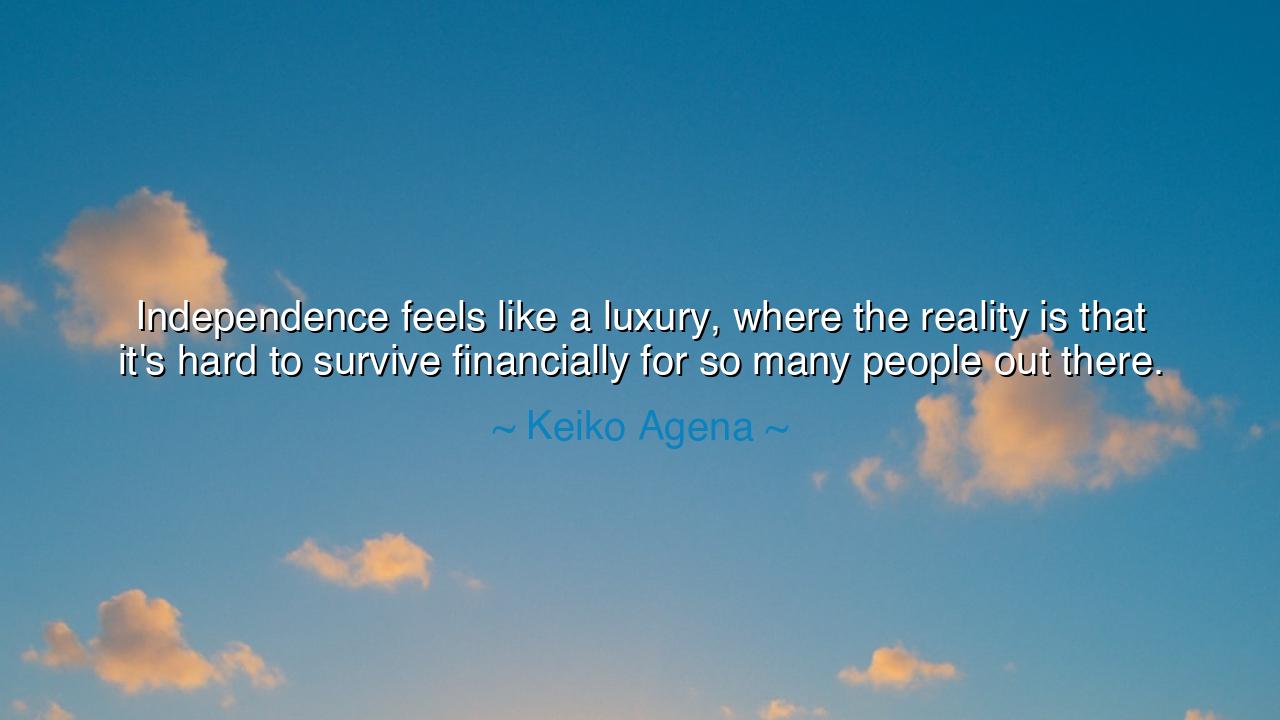
Independence feels like a luxury, where the reality is that it's
Independence feels like a luxury, where the reality is that it's hard to survive financially for so many people out there.






The words of Keiko Agena, when she said, “Independence feels like a luxury, where the reality is that it's hard to survive financially for so many people out there,” speak with the quiet sorrow and unflinching honesty of truth seen from the heart. In these words lies a tension that has existed since humankind first began to dream of freedom — the dream of independence, shining like a distant star, and the weight of survival, pressing down like the earth itself. Her words are not of despair, but of awareness: that for countless souls, the struggle for freedom is not of spirit alone, but of bread, shelter, and the price of living.
For many, the word independence glows with promise — a life guided by one’s own will, free from dependence on others, unchained by circumstance. Yet Agena unveils the harder truth — that for too many, such freedom has become a luxury, not a right. The poet may speak of liberty as a flame of the heart, but the worker who toils without rest knows that fire cannot burn on an empty stomach. The ancient sages would have understood this paradox well: that true independence must rest upon both the spirit and the body, upon courage and the means to sustain it. Without one, the other fades into longing.
Consider the story of Sojourner Truth, born into slavery, her life bound by the chains of others’ power. She escaped to freedom — an act of will as brave as any in history — yet even in her freedom, she faced poverty, prejudice, and peril. Her independence was not an easy gift, but a daily labor, forged through faith and persistence. She walked from town to town, preaching truth and justice, earning with her voice what others were given by birth. She lived what Agena’s words reveal — that independence, though precious, demands endurance, and that the path toward it is steep for those denied the foundation of financial security.
The reality that Agena speaks of — the hardship of surviving in a world of rising costs and unequal chances — is the silent weight that millions carry. It is the artist who cannot afford to create, the parent who works two jobs and still struggles to rest, the student whose debt delays their dreams. For such souls, the pursuit of independence is not the pursuit of luxury, but of dignity. And yet, in the eyes of society, those who labor for survival are too often seen as lacking ambition, rather than courage. Agena’s words tear away this illusion: they remind us that freedom without access, liberty without means, is but an echo of justice unrealized.
There is also humility in her truth. To call independence a luxury is to recognize our interconnectedness — that no one is truly self-sufficient. Even the strongest rely upon others — the farmer on the rain, the doctor on the nurse, the artist on the audience. The ancients knew this balance well; they taught that no tree grows in isolation, for its roots intertwine with others beneath the soil. In the same way, a just society must nourish the conditions that allow its people to stand upright — not by charity, but by fairness; not by pity, but by opportunity. When one’s basic needs are secure, then the soul may truly rise.
Yet, we must not let truth breed despair. For in recognizing the hardship of independence, we are also called to compassion and solidarity. To know that freedom is hard-won is to be reminded of our duty to one another — to build bridges, to uplift, to share knowledge and means so that independence may no longer be a luxury, but a living possibility for all. The wisdom of Agena’s words lies not in resignation, but in awakening — an awakening to the truth that the struggle for survival, though hard, binds us in shared humanity.
So, O listener, take this teaching into your heart: do not judge another’s struggle, for every act of endurance is an act of quiet heroism. Strive, if you are able, to make independence less of a privilege and more of a birthright. Help where you can — through generosity, through fairness, through creating paths for others to walk beside you. And if you yourself walk the narrow road of survival, know that your persistence is not weakness, but strength. Each day you rise again is a victory unseen by the world, but sacred in the eyes of truth.
Thus, the wisdom of Keiko Agena becomes eternal: that independence is not simply the freedom to choose, but the power to endure — and that such power is made possible when we lift one another toward it. Let us, then, build a world where independence is no longer a distant luxury, but the common inheritance of all — where every heart, freed from fear of want, may live not merely to survive, but to create, to love, and to dream without restraint.






AAdministratorAdministrator
Welcome, honored guests. Please leave a comment, we will respond soon